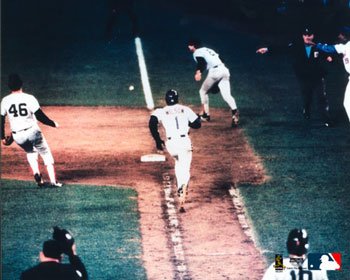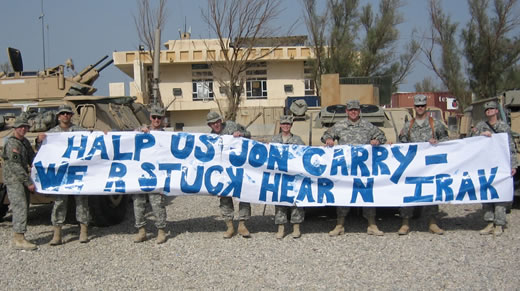 Note: I promised more than a whole war ago to review my Benelli Nova Tactical pump-action shotgun, and before the last war I wrote a whole article with pictures and everything only to have a Blogger service outing wipe out the whole thing before I could save it. And since I had promised that review next, I have to write this before I get anything else out, so here it is.
Note: I promised more than a whole war ago to review my Benelli Nova Tactical pump-action shotgun, and before the last war I wrote a whole article with pictures and everything only to have a Blogger service outing wipe out the whole thing before I could save it. And since I had promised that review next, I have to write this before I get anything else out, so here it is.If there's anything that convinced me of the need for personal protection, it was the breakdown in social order that followed Hurricane Katrina. Now, New Orleans was never highly-regarded for social order, probably part of its appeal, but there's something about portable firepower that has a way of convincing ne'er-do-wells that things are actually better with the cops around. Cops have rules. Homeowners, eh, not so much.
When it comes to firepower, one definition is "the relative capacity for delivering fire on a target". In firearms literature, this is usually some combination of rapidity of fire combined with the impact of fire on the target, with some debate about slower & heavier vs. faster & smaller. One thing that is relatively not debated is the apex of short-range defensive weapons available to civilians: concealed-carry concerns aside, the winner is always the shotgun.
Seeing as the shotgun is a smoothbore weapon as at home in the 18th century as the 21st, this would seem to be counter-intuitive. Part of the reason for the utility of the shotgun is the inherent flexibility in choice of projectile. Shotguns can shoot birdshot (tiny pellets), buckshot (multiple large pellets between .17 and .36 caliber), and slugs (one single large ball of lead or copper). You can hunt anything from dove to bear with a shotgun, and have a reasonable chance of success. In addition to the metallic projectiles, there is bizarre variety of other projectiles that can be loaded into a 12-gauge barrel that is .729 inches in diameter, from beanbags to little darts (flechettes) to illuminating rounds to bags of metallic poweder designed to blow a lock apart without killing anyone on the other side. The shotgun survives in part due to its flexibility.
But the original claim was in regard to short-range firepower, and a bit of math is due here. The fastest pistol shooter in the world is
Jerry Miculek of Bossier City, Lousiana. Mr. Miculek can fire
eight .356-diameter .38 Special rounds in one second, and cover the group with the palm of his (large) hand at ten feet. He's a freak, and he's the best. Heckler & Koch's famous
MP-5 submachine gun is a 9mm weapon reknown for reliability and controllability in full-auto fire. A trained operator can fire
13 9mm (.356 diameter) rounds in one second, and most likely hit his target with nearly all of them.
By comparison, a single round of 12-gauge 000 buck fires eight .36-caliber balls in one trigger pull. Assuming you can rack the slide and pull the trigger in one second (not difficult at all), a shotgun user can get
16 projectiles on target faster than any other hand-held means. With proper motivation, three shots a second are possible for a total of
24 aimed projectiles per second. And if you shoot a slug, the impact is appreciably greater, with a 429-grain (one ounce) lead slug moving out at 1600 fps or greater. By comparison a .44 Magnum fires a 240-grain bullet at roughly the same speed. The impact is significantly more powerful at short range than all but the heaviest big-game rifles. In short, a shotgun has 100% more firepower than the fastest pistol shooter in the world, at least 20% more than a fully-automatic submachinegun, and you can buy them with nothing more than a Form 4473. Ain't this a great country?
So the 12-gauge shotgun owns the flexibility and firepower titles. And a further feather in its cap is the fact that shotguns are less likely to be dangerous at long ranges in case you miss. The round projectiles of a shotgun lose energy in the air much easier than aerodynamic bullets, even for strictly defensive purposes you must be sure of your backstop up to 3
miles beyond your target with a rifle like an AR-15 or AK-47, and even pistols pack a punch at long range. Using a weapon defensively, a major goal is to not shoot through walls and injure noncombatants, and to not cause injuries to those uninvolved. Shotgun shot in the BB range (.17-caliber) is not predicted to penetrate a wall with lethal force, and is not expected to be even injurious beyond 80 yards or so. It can be disconcerting to have birdshot fall on you on the Sporting Clays course, but it's unlikely to hurt you. Properly used, a shotgun will hurt what needs hurting and protect what needs protecting.
And as far as the pump-action, it's reliable and simple and requires less cleaning than a semi-automatic weapon. It's relatively insensitive to ammo choices and won't balk at light or heavy loads. Plus, the distinctive sound of a pump-action shotgun being loaded has a cachet and deterrent effect all its own.
When it comes to buying a pump, there are numerous options from
Winchester/FN,
Remington,
Mossberg,
Maverick and a variety of foreign makers as well as specialty manufacturers like
Wilson Combat's Scattergun Technologies division. Making a personal defense shotgun generally involves obtaining a shotgun with a shortened barrel, to allow for maneuverability in enclosed spaces. Different sights may be selected and an extended magazine added to increase the number of rounds carried, a small magazine capacity being one of the drawbacks of a shotgun. I considered the FN Tactical Police model, and the Mossberg 590 series, but they're both a little more than I wanted to spend. Instead of buying a Remington 870 or a Maverick 88 and doing all of this work myself, I went with the
Benelli Nova Tactical.
Ordered from the factory, it comes with a legal 18.5" improved cylinder barrel and "ghost-ring" sights well-suited for fast and accurate target acquisition. The Nova came out in the 1990s, and has been proven over time to be a reliable and simple design. The forend and stock are plastic to reduce weight and signs of wear, with a plastic receiver holding a metal insert for strength. The unitary stock prevents adding a pistol grip or folding stock, two things that other than the
Knoxx CompStock I find to be unnecessary.
Being unable to leave well-enough alone, I added a Weaver rail to accept a secondary sight like an
EOTech or
Aimpoint, and a magazine extension tube from TacStar. Benelli has unaccountably stopped selling magazine extensions to civilians, and rather than paying $150 for one on E-Bay I went with the
TacStar aftermarket one for $50 and also added a "sidesaddle" shell carrier on the left side of the receiver that holds four extra rounds for faster reloads or flexibility in load selection. The pump action allows me to switch quickly between slug and buckshot depending on the range to the threat. I can put a slug on target to about 50 yards or so, which is a relatively long shot for buckshot and gives me -- again -- flexibility.
The gun itself was $371, the
Weaver rail plus installation was $105, the mag extension was $50 and the shell carrier $30, for an all-up cost of $556 or so, tax and shipping included. Compared to the Scattergun Technology offerings, which start at a grand or more, this seems to be a rather cost-effective system. The Nova is one of the few shotguns, especially in this price range, to allow use of 3-1/2 inch 12-gauge shells for shooting at geese and, I guess, tanks and APCs. I don't plan to use these, the standard 2-3/4" shells work fine and with the magazine extension I can carry seven in the tube and one in the chamber, for a total of 8 shots. Added to the four on the sidesaddle, that's an even dozen 12-gauge rounds on or in the gun, enough to deal with nearly any eventuality. Empty and with the stated modifications, it weighs 7.6 lbs and handles well. Pumps can be stiff from the factory, this one is not. The ghost-ring sights are adjustable if need be, and work very well for aiming. The trigger is smooth and doesn't have much in the way of creep or overtravel, at least in my opinion. It's not glass-rod smooth, but this isn't a target rifle.
So it looks intimidating as heck, particularly when being held by someone as big as me, but how does it shoot? The Wife and I took a trip to the lovely East Texas Rifle and Pistol Club for some shooting. As I had never before fired slugs or buckshot, I went to Academy and loaded up on Remington Express (i.e., inexpensive) 1 oz. slugs and No. 4 buckshot (.24-caliber), tossed in some IPSC targets of roughly humanoid shape and drove the few miles to the club.
 East Texas Rifle & Pistol Club, one of the five ranges
East Texas Rifle & Pistol Club, one of the five rangesHaving recently fired a couple hundred rounds of #7 1/2 shot at the ACU Sporting Clays event (where our team took third without practicing, have I mentioned that?), I had some recent memory of what recoil in a gas-operated semiautomatic shotgun is like, and this brings me to the other drawback of shotguns. They do not repeal Newton's Laws, if you're throwing a lot downrange, it will throw a lot back at you. Standard slugs have considerable recoil, more than my brother's .308 and more than I have fired previously in a shoulder-mounted weapon. Not enough to make me flinch, but enough to make me know that something powerful just happened. The short barrel (9.5 inches shorter than my Beretta AL391) and light weight (8-9 lbs loaded) of this shotgun are no help in this regard. If the Nova had the ability to add aftermarket stocks I would probably go with the
Knoxx Compstock as I have seen this recommended in many publications. As it is, I will probably shoot my Remington Express for practice and carry
Remington Reduced-Recoil Slugs. Why get beat up? Benelli also offers a mercury weight system in the stock to add another 13 ounces, but I have heard varying reports on the effectiveness of this addition.
Before:
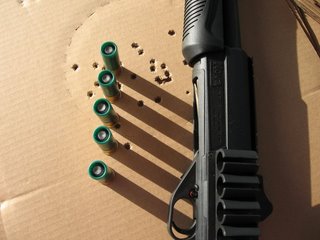
And after:
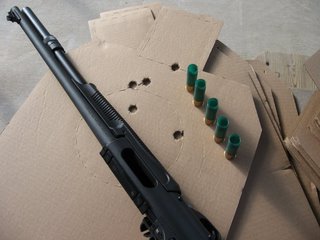
As you can see from the target, fired standing offhand at 25 yards, it's accurate enough for combat purposes and leaves BIG holes, the diameter of my index finger. Any of those hits is going to be instantly incapacitating and most likely lethal.
I fired two rounds each of #4 buckshot at 10 and 15 yards. A pic of me in action:
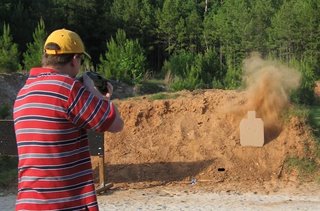
Shot doesn't spread as much as you'd think, but sometimes more than you want. The rule of thumb is that it spreads one inch a yard, so even at close ranges you still have to aim a shotgun. It's easier to aim with two hands, though, so it works out pretty well compared to a pistol. The larger holes are where the plastic wad that holds the shot in the barrel punched the paper.
Ten yards:
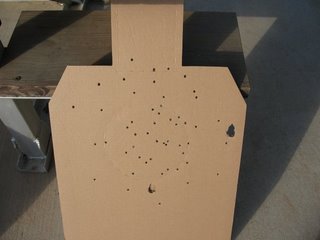
Fifteen yards:
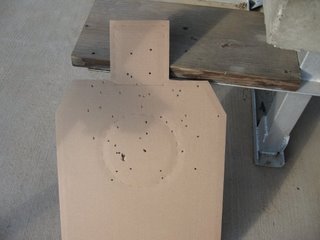
That's 27 .24-caliber pellets per shot, moving out at about 1200fps. This is like you and your 26 best friends firing one shot from one of those cheesy little Raven .25 ACP pistols all at the same target at the same time. Lots of little holes do make a mess. At 15 yards, nearly all pellets stay within the average torso size.
A final note about the sights. Ghost ring sights employ an interesting physiologic ability most people do without thinking. One of the tricks most humans do well is centering something within a circle, in this case the circle is the rear sight that will "ghost out" or become blurry. The thing to be centered is the front post, in this case a nice bright white dot. This works even for people who have age-related nearsightedness, which I do not but will, assuming I live long enough. It's a fast and easy way to get sights on target, and missing with a shotgun doesn't help anybody. The sight picture looks something like this:
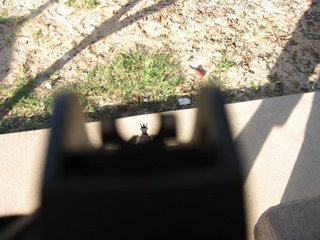
In summary, the Benelli Nova Tactical is a relatively inexpensive personal defense weapon. The Nova line has earned a reputation for reliability, and as it has been said that "There are two things you never want to hear around a firearm: a bang when there should be a click, and a click when there should be a bang," the Nova has at least the latter covered. For defensive purposes, it's about ideal for a house gun with appropriate ammo (typically BB shot). And I emphasize defensive purposes, because your ability to hit reliably beyond 75 yards will likely be limited. A rifle can do that, but if it's more than 75 yards from you, it raises a question as to whether or not it's self-defense. If I had to add anything else, I would add a flashlight of some sort for low-light conditions. Particularly for home defense, it's important to know WHAT you're shooting at and WHAT'S BEHIND your target, and sometimes all it takes is the Lithium-Powered Light Of Truth And Justice to make people reconsider their choice of actions.








